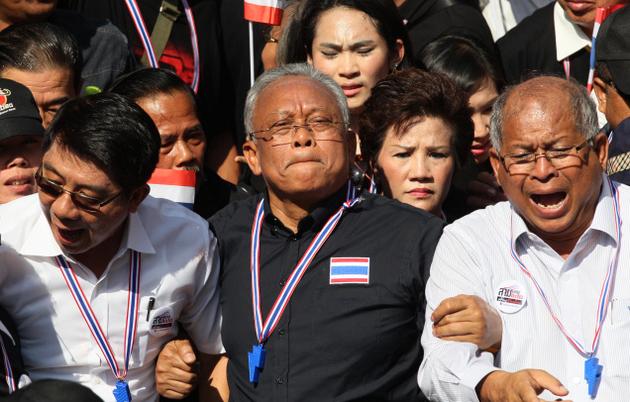
Thailand opposition leader Suthep Thaugsuban marches with supporters in Bangkok. Thousands of protesters took control of several government buildings on Nov. 25-27, 2013, forcing them to shut down. Photo: AP
In my update on Thailand and Maldives a few weeks ago, both countries were on the precipice of making decisions that would determine the direction of their democracies, or lack thereof. Let’s see how things turned out.
Thailand
On Monday, Nov. 11, 2013, Thailand’s senate made a strong statement against former Prime Minister Thaksin Shinawatra, who fled the country rather than face corruption charges (among other alleged misdeeds). In ruling on legislation that would have absolved Thaksin of wrongdoing and paved the way for his return, the senate unanimously said no: 141 votes against the proposal, zero for.
Thailand’s opposition took the vote as a stepping stone for further, more overt action and called for strikes, protests, and other shows of civil disobedience. To them the senate’s decision reflected disapproval of current PM Yingluck Shinawatra’s government (ties of current leaders to the old regime run deep–Yingluck is Thaksin’s sister; similar links exist in Maldives too, as discussed below).
Now two weeks later, the antagonism has intensified. Protesters have stormed multiple government ministry sites, in some cases forcing evacuations. Five ministries have been closed due to protest activity in 2 days, with opposition leaders demanding Yingluck’s resignation. Not surprisingly, she has stated she has no intention of doing that.
It’s hard to tell how this will end. While political turmoil has existed in Thailand for some time, anger and distrust are now at very elevated levels.
Check out FPA blogger Tim LaRocco’s take on the situation here.
Maldives
Democracy just can’t seem to catch a break in Maldives. After finally being allowed in the presidential election, Mohamed Nasheed was defeated by Abdulla Yameen in a run-off on Nov. 16, 2013. Yameen is the half-brother of, and former finance minister for, Maumoon Abdul Gayoom, Maldives’ dictatorial ruler of 30 years (who was beaten by Nasheed in a 2008 election, the first democratic race in the country’s history).
Yameen’s victory has some worried that the old autocratic ways of Gayoom are on the way back. Yameen also favors conservative, pro-business policies and political rule tied to Islamic principles. Nasheed represented more progressive interests and closer association with West; he accused Yameen of using religion unfairly as a weapon.
Despite feelings about the result, this election was considered fair by impartial observers. But the future remains ominous for this troubled island nation.